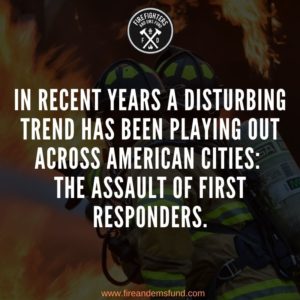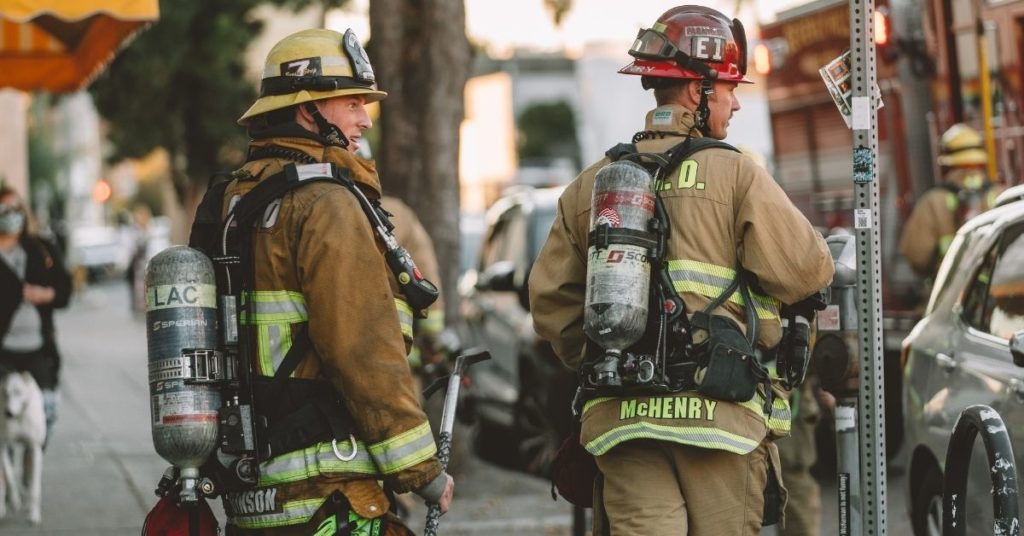In recent years a disturbing trend has been playing out across American cities: assaults on first responders and EMS workers.
And the assaults are not isolated to those responding to a potential violent crime.
Envisage Technologies compiled a report noting that in just the city of Chicago alone, “at least once a day in Chicago, paramedics who are trying to save lives end up fighting off an assault. Now paramedics and other first responders are constantly on the defensive.”
Fire Rescue 1 also reported a recent tragedy in July when EMT Jacob Dindinger was murdered when responding to a call in Tucson, Arizona:
“Dindinger was shot in the head by suspect Stephen Scarlett, 35, who died after being shot by responding police at the scene at Silverlake Park. Dindinger and his partner were staged there during a shooting and house fire, AZFamily reported.“
3 Ideas to Reduce Assaults on First Responders & EMS Workers
With EMTs and other first responders, including firefighters, being at an increased risk of assault, we need solutions to protect our first responders. Here are three ides to reduce assaults on first responders and EMS workers.
1. Arming First Responders
EMS 1 covered several cases of local governments in America authorizing their emergency personnel to carry weapons when responding to calls. While the two most notable cases do not allow EMTs to carry weapons to every call, they do specifically allow it in the event that they are responding to a scene along with local SWAT teams. In Green, Ohio, “…tactical paramedics are now permitted to carry handguns when called out to assist the sheriff’s SWAT team.” This authorization was able to pass, after local concerns that paramedics would be able to carry firearms to all domestic calls were calmed. The EMS 1 report also notes that in 2019, Governor Ron DeSantis signed an act authorizing sheriffs and police chiefs to arm medical personnel when joining SWAT calls, as well. Arming first responders is a complicated issue which would require additional training but may well serve to save lives in certain high risk scenarios where most medical personnel are otherwise defenseless.

2. Non-Violent De-escalation
The controversies and debates surrounding the use of force to subdue potentially violent individuals have renewed over the last year following George Floyd, and other violent encounters between suspects and police. Many activists and other groups advocate literacy in non-violent solutions to de-escalating tense, and potentially violent, encounters. The same benefit that may be awarded law enforcement from learning these skills, can also be had by EMTs. Luckily more resources are being made available to teach these skills to first responders. EMS 1 even has an entire online video course on 11 different strategies for de-escalation, found here.
3. Increase Penalties for Assault Against First Responders
One of the easiest solutions to deterring patients and suspects from assaulting EMS workers would be to create harsher penalties for assaulting them, similarly to how it is a felony to assault a police officer. Violent felonies against police officers typically mandate a minimum two years in prison. In 2015, for instance, New York state passed a law to do just this very thing. In the above noted case of Chicago, assaults on emergency workers occur on a nearly 1 per day basis. But only 60 cases were prosecuted over a two-year basis. Stiffening penalties for assault on EMS workers will not stop it from occurring but it can lead to a long-term reduction in violence.
Unfortunately, the issue of violence directed towards emergency workers and first responders does not appear to be slowing down. But these three potential strategies can help alleviate the problem. They are designed to make EMS workers more prepared to face a violent encounter, giving them a defense for moments that cannot be controlled solely by legislating away a problem. But strengthening laws to act as deterrents against a potential assault are a necessary addition to the framework with which EMS workers go out into a potentially hostile world to do their jobs serving the public.
Image Credit: Photo by Spencer Davis on Unsplash
In May, Florida legislature, at the behest of Republican Governor Ron DeSantis, announced the inclusion of one-time Covid relief payments to the state’s teachers and first responders, including firefighters and EMTs. While the gesture of rewarding those who continued to serve our communities in person during the unprecedented Covid-19 pandemic is unquestionably noble, controversy still arose over DeSantis’s bill.









